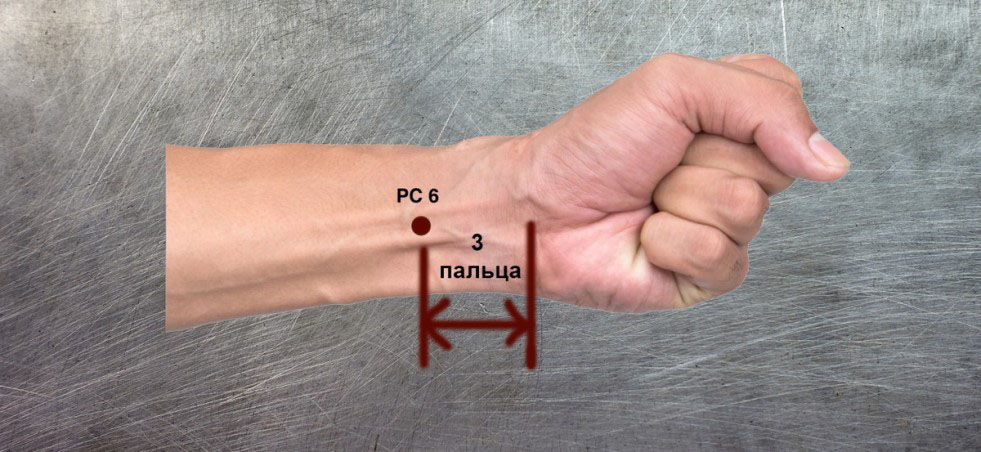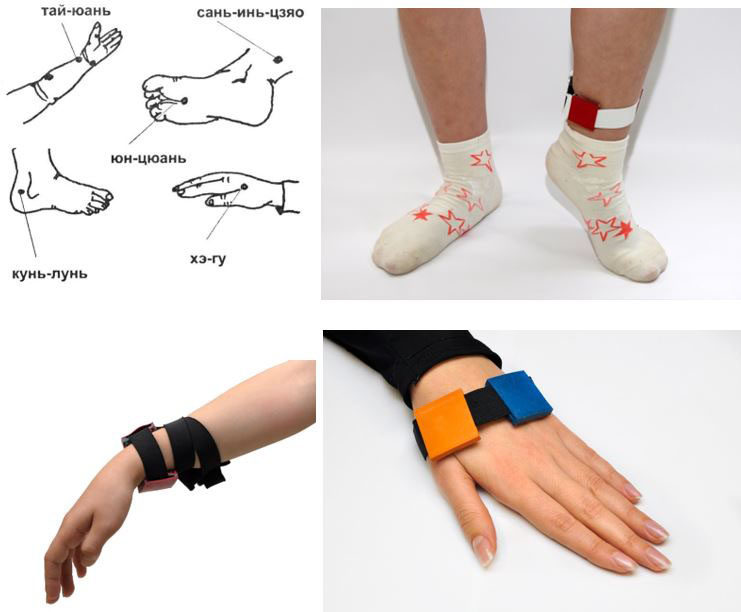Sleep
1 Sleep is an important component of health
2 The physiological role of sleep
Sleep is an important component of health
Sleep (lat. somnus) is a periodically occurring physiological state, opposite to the state of wakefulness, characterized by a reduced reaction to the outside world.
During sleep, brain activity does not decrease, but is rebuilt. A person spends a third of his life in a dream: he sleeps for 25 years out of 75.
Sleep is an important component of health, cheerfulness, good mood, and high working capacity. The first sign of fatigue is the desire to sleep. So the body signals the need for rest to restore strength.

Unfortunately, most people pay little attention to this state of the body. But it is precisely the physiology of sleep that is the central cause of activity during the day. Sleep, as a special state of the body, is characterized by specific cortical-subcortical connections and the production of special biologically active substances. It helps to reduce the risk of complications in various diseases.
Artificial sleep deprivation is a difficult test: volunteers experience emotional imbalance, increased fatigue, delusions, vestibular dysfunctions, hallucinations appear after 90 hours of sleep deprivation, depersonalization after 170 hours, and mental and psychomotor disorders after 200 hours.
Studies have shown that young people need an average of 8.5 hours of sleep a night; the duration of a night's sleep of 7.2-7.4 hours is insufficient, and sleep less than 6.5 hours for a long time can undermine health.
The effect of "accumulation of lack of sleep" completely disappears after the first 10-hour period of "recovery" sleep.
The physiological role of sleep
Sleep performs the following functions:
- recovery - the predominance of anabolism processes (plastic metabolism in the body);
- anti-stress - sleep is one of the mechanisms of mental protection of the individual;
- adaptive - synchronization with the cycle of day and night ensures optimal interaction of the body with the environment, preparing the body for activities during wakefulness;
- role in the processing of information - the implementation of the process of memory consolidation: the transfer of information from short-term to long-term memory.
Sleep is directly related to the immune system, and lack of sleep threatens to destroy immune blood cells, according to American doctors. A group of big guys had their sleep reduced for one night. The number of cells that fight viral infection decreased by 30%. It stayed that way until the subjects got enough sleep.
Somnologists believe that after 1 sleepless night, the body needs three days to restore biorhythms. If you don’t get enough sleep for 3-4 days, then a week may not be enough to get back to normal.
A woman needs at least 8 hours to fully recover, a man needs 6.5-7 hours.
This is due to differences in brain activity in the representatives of the stronger and weaker sex. It has been proven that women have more complex brain activity, they are able to simultaneously solve multiple tasks and process the amount of information 5 times faster than their male counterparts. And since sleep is the time to "reset" the neurons of the brain, women need additional time to resume vigorous activity.
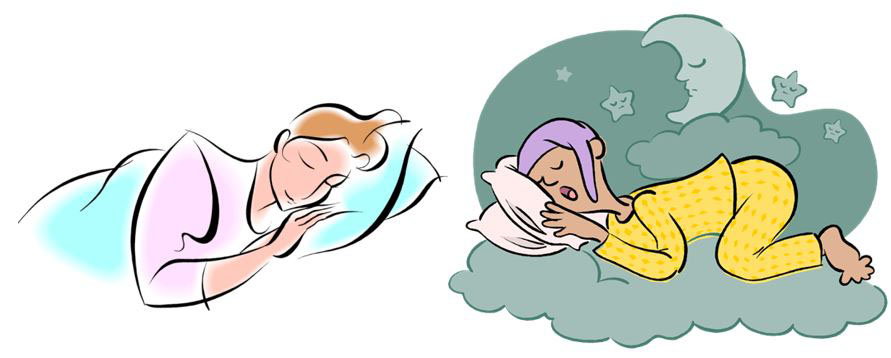
There are six types of sleep
Three of them are conditionally called healthy sleep:
- Physiological - is considered the most useful, safe, comes gradually, focusing on the physical needs of the body and the internal clock.
- Medicamentous - used during operations. After the introduction of a narcotic drug, a person is immersed in a state of unconsciousness.
- Hypnotic - a type of unnatural sleep, which is actively used in medical practice. Through suggestions during hypnosis, a part of the nerve centers of the brain responsible for active thinking is inhibited.
There are also pathological types:
- Asomnia is the absence or disturbance of sleep. The causes of this disorder can be severe stress, overwork, taking medications that excite the cerebral cortex, various external stimuli, getting rid of which you can cope with the problem of insomnia.
- Sleepwalking is a condition where a person is awake with their eyes closed. The activity takes place in an unconscious state, can harm the sufferer of sleepwalking. Due to excessive pressure on the nervous system, the process of proper functioning of brain cells is disrupted, which contributes to vigorous activity that occurs unconsciously.
- Lethargic sleep - characterized by slow processes of the whole organism, they are minimized, in the absence of a reaction to external stimuli. It can be caused by both serious diseases and peculiarities of the nervous system.
Sleep phases
There are two phases of sleep: slow (slow wave) and fast (paradoxical).
The slow phase is the main phase of sleep, which is interrupted several times by the fast phase.
The duration of slow-wave sleep is 75-85%, and REM sleep is 15-25% of the total duration of a night's sleep.
During a night's sleep, a person has three to five periodic shifts of slow-wave and REM sleep.
The following phases of sleep are distinguished:
- Drowsiness, characterized by inhibition of the main alpha rhythm. This stage lasts about fifteen minutes.
- The stage of light sleep is determined by the shutdown of human consciousness. There is a slow descent into unconsciousness. Hearing is more sensitive to sharp sounds. Waking up a person during such a period is not difficult. This stage lasts about twenty minutes.
- The third is deep sleep. This process also takes about twenty minutes.
- The fourth phase of slow sleep. She, like the third, is part of deep sleep. At this time, a person’s sleep is quite strong, it is almost impossible to wake him up. It is at the fourth stage that such pathological manifestations as sleepwalking and enuresis appear. During non-REM sleep, physical recovery occurs. This is the main component of night sleep. If you break the slow phase, in the morning you will feel tired, weak all over your body.
- phase - fast phase of sleep, occurs immediately after the fourth stage. This stage is characterized by accelerated eye movement. The activity of the brain during this period is similar to the activity during wakefulness. It is during these hours that the human brain actively processes the information received during the day. In this phase, the best recovery of the nervous system occurs. In the phase of REM sleep, awakening is considered the most favorable, and the dreams that are dreamed during this period are the most colorful and memorable.
Sleep disorders
Sleep disorders are very common among the population of civilized countries. Insomnia is a chronic disease associated with a violation of the synchronization of the biological clock with circadian rhythms. Sleep disorders are noted in 45% of the urban population. Among rural residents, insomnia is much less common.
Reducing the duration of sleep - one of the constant signs of insomnia - is relatively rarely pronounced. With partial insomnia, there are periods of wakefulness at the beginning, middle and end of the night. With total insomnia, wakefulness predominates, only occasionally interrupted by drowsiness. This type of insomnia is much less common.
Sleep disorders can also include increased drowsiness, the so-called hypersomnia, which can be observed in people with a weak nervous system, with inflammatory diseases of the brain. It can be considered as a protective reaction that protects nerve cells from overstrain. Drowsiness also occurs with anemia and functional disorders of the nervous system.
Lack of sleep affects figurative thinking: if after a sleepless night it is still possible to answer the questions of a simple test, then it is impossible to write an essay.
Why is insomnia dangerous?
Insomnia is a ticking time bomb in your body. Starting with difficulties falling asleep and short-term sleep disorders, it leads you to nervous and physical exhaustion, causes severe CNS disorders, depression, psychoses, and increases the risk of developing dangerous diseases (heart attack, stroke). Insomnia significantly reduces the quality of your life, causes apathy, increased fatigue and irritability. Memory problems may occur, physical and mental activity may decrease, which will negatively affect your professional activities.
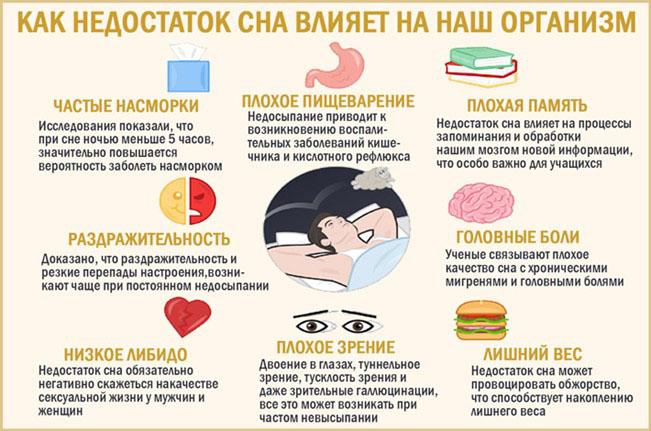
Causes of insomnia
The reasons can be: stress and depression, alcohol abuse, shift work, sleep disturbances, time zone changes, side effects of drugs, unfavorable sleep conditions, neurological, somatic diseases, overwork.
How our biological clock works
All biological processes in our body are directly related to the cyclic change of day and night, that is, with the rotation of the Earth around its axis. They are called circadian rhythms, that is, "day" or "day" is our biological clock. Well-being, normal functioning of the body and the correct rhythm of hormone production in our body depend on a harmonious, corresponding to natural cycles, ratio of sleep and wakefulness.
During the day, the body is tuned to the processing of nutrients and energy for vigorous activity. And during the night there is an accumulation of nutrients, restoration of strength and healing of the body. Circadian rhythms are controlled by our hormones.
In the evening, before nightfall, the pineal gland - the pineal gland - secretes the sleep hormone melatonin. This substance is produced only when we sleep, in complete darkness. Any rays of light falling on closed eyes destroy melatonin. In the elderly, insomnia is often associated with insufficient secretion of melatonin by the pineal gland.
Melatonin is produced from 11 p.m. to 1:00 a.m. - 1:30 a.m. Therefore, you must definitely go to bed before eleven in the evening.
How does melatonin work in the body? It causes a decrease in body temperature, regulates the duration and change of phases of sleep: slow-wave and paradoxical.
In addition to the entry of the sleep hormone into the blood, the onset of light night is accompanied by other hormonal changes: the production of growth hormone (somatotropic hormone) increases and the production of adrenocorticotropic hormone (ACTH) by another cerebral appendage, the pituitary gland, decreases.
Growth hormone, among its other functions, is the most fat-burning hormone. It stimulates anabolic processes, such as cell reproduction and the accumulation of nutrients (glycogen) in the liver. Growth hormone is produced during sleep, from 11 p.m. to 1 a.m. If you are awake at this time, then you are losing the fat-burning hormone itself.
Therefore, often people who fall asleep after one in the morning are overweight.
Adrenocorticotropic hormone causes the release of adrenaline and other stress hormones (glucocorticoids) from the adrenal cortex into the blood, so lowering its level allows you to remove daytime excitement and fall asleep peacefully.
At the time of falling asleep, opioid hormones that have a narcotic effect, endorphins and enkephalins, are released from the pituitary gland. That is why the process of falling asleep is accompanied by pleasant sensations.
Before waking up, a healthy body must be ready for activity, therefore, closer to the morning, the adrenal cortex begins to produce glucocorticoid hormones that excite the nervous system. The most active of them is cortisol, which leads to increased pressure, increased heart rate, increased vascular tone and reduced blood clotting.
The adrenal glands begin to synthesize it at three or four in the morning, and its concentration reaches its peak by six or seven in the morning, just in parallel with the decrease in the concentration of melatonin. It is assumed that it is at this time that a person awakens. If this does not happen, the "good guy", the hormone of vivacity and energy cortisol turns into a "bad guy" and becomes a stress hormone. Waking up every day before seven in the morning is one of the methods of controlling stress.
The discrepancy between internal biological rhythms and the real daily cycle of activity leads to “circadian stress”, which, in turn, can cause the development of many diseases, including hormonal disruptions, depression, insomnia, pathology of the cardiovascular system, and a decrease in the functioning of the immune system.
There is such a thing as seasonal affective illness - seasonal depression associated with a decrease in the length of daylight hours in winter. With seasonal depression in the patient's blood, the level of the main adrenal hormone cortisol, which greatly depresses the immune system, rises. And reduced immunity inevitably leads to increased susceptibility to infectious diseases. So it is possible that short daylight hours are one of the reasons for the surge in the incidence of viral infections in the winter.
How to wake up properly. In the morning after getting up, you need to drink a glass of water at room temperature and have breakfast in the first hour after waking up. This will reduce the level of cortisol and start the proper functioning of all organs and systems.
Psychosomatics of insomnia
The function of falling asleep is under the control of the brain, but when the mind is overstrained by any experiences, the nervous system also becomes tense, and malfunctions begin in its work.
Psychology associates insomnia with strong emotional experiences relating to the past (eg, thoughts and emotions of the past day) or the future (eg, anxiety about upcoming events tomorrow). If a person were concentrated on the present, then he would not suffer from insomnia.
Another cause of insomnia is internal dialogue. Usually such a dialogue is launched against the background of resentment, a conflict with someone, when a person inside himself continues to sort things out. Preconditions for healthy sleep are a tired body and mental balance. To fall asleep, a person needs absolute trust and relinquishment of control.
How to overcome insomnia
To improve the quality of sleep, you need to pay attention to the following recommendations: follow proper nutrition; control coffee intake; do not disturb the sleep pattern; sleep in one place; provide a comfortable bed; rest in the dark do not allow daytime sleep; eliminate irritating factors; carry out evening hygiene; do not neglect the evening walk; take a warm bath in the evening.
Set your "biological clock". Proper sleep is essential for mental and physical health. Try to wake up and go to sleep at the same time every day, according to your circadian rhythm. The best time to get 8 hours of sleep is approximately 10:00 pm to 6:00 am local solar time.
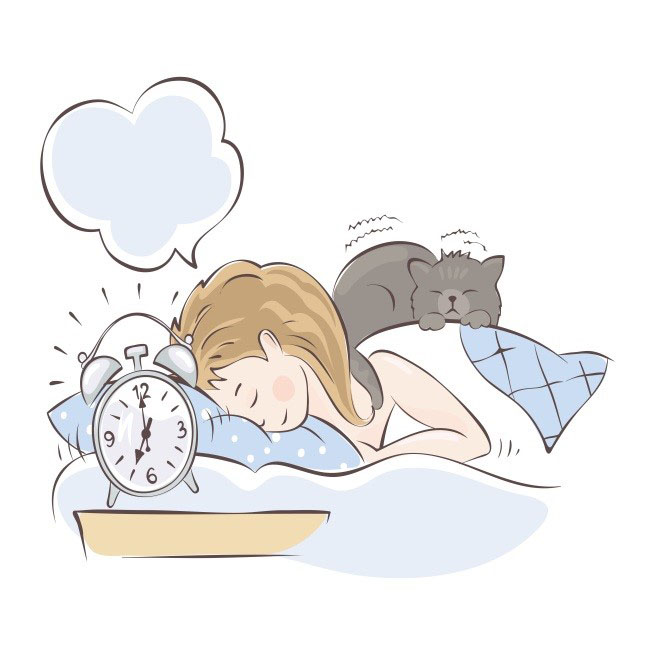
Add foods that promote the production of melatonin and serotonin to your regular diet. Among them are turkey meat, salmon, cheese, walnuts, whole grain bread.
Do a light self-massage. A light relaxing massage is a good way to relieve physical and emotional stress and normalize sleep.
Go in for sports. Regular physical activity helps to solve many problems with sleep. Swimming, dancing, running, exercising in the gym and other types of physical activity not only help relieve accumulated tension, but also improve the quality and duration of sleep. The most suitable options for a later time are yoga, stretching and walking.
Animal therapy is a special kind of psychotherapeutic help when various animals are used to treat patients: cats, dogs, horses, dolphins, or even some insects. Many people who have pets note that communication with them is uplifting and makes them happy.
Since ancient times, people have been treated with the help of animals. They helped them in many ailments. Now this trend is gaining momentum. Many have already appreciated its effectiveness. For example, some companies are encouraged to come to work with pet dogs (canistherapy). This improves the psycho-emotional mood of employees, increases efficiency, and strengthens the corporate spirit. Communication with animals improves the psycho-emotional state, relieves depression, strengthens the nervous system, increases efficiency, strengthens sleep.

Take a walk, chat with your pet in the evening and you will have a sound sleep.
Application therapy Lyapko to improve sleep
Lyapko applicators are a good way to improve sleep and prevent insomnia.
Lyapko's applicators in various modifications (plates, rollers, applique belts, applique tapes) are an original, powerful device with many health-improving therapeutic possibilities. Their action is based on the principles of traditional Chinese medicine - superficial multi-needle acupuncture, as well as on the general physiological mechanisms of life.

Mechanisms of action of the applicator
The high healing effect of Lyapko applicators is due to a combination of intense reactions:
- reflex-mechanical;
- galvano-electric;
- immunological.
The clinical effects of the method of multi-needle therapy are manifested in analgesic, antispasmodic, anti-inflammatory, anti-edematous, neurotrophic and immunomodulatory effects. Also in the regulation of the functions of the autonomic nervous system, the normalization of the processes of excitation and inhibition in the central nervous system.
Lyapko's application methods consist in stimulating the main, as well as specific reflex points on the surface of the human body. The use of Lyapko's application methods contributes to the rapid replenishment of the body's plastic and energy resources, the activation of enzymes and the change in the enzyme-substrate ratio of various metabolic reactions, the achievement of a balance in nervous processes, and the acceleration of the excretion of catabolism products.
When exposed to the applicator in the evening before bedtime for more than 30-40 minutes, a modulating block of neuroendocrine reactions is activated in the body with the release of analgesic factors - stress-limiting hormones and internal opioid hormones (hormones of happiness) endorphins, enkephalins, cytokines, mediator amines, neuropeptides, histamine, acetylcholine and other biologically active substances. That is why the process of falling asleep is accompanied by pleasant sensations, and many patients fall asleep during the application therapy, and wake up rested and full of energy in the morning.
Before application therapy, it is good to do a manual body massage using the Pharaoh massager . Long, up to 15 min. and more, massage contributes to the complete relaxation of muscles, creates a sedative (calming) effect. After the massage, we recommend laying on a flat applicator for rest and relaxation.
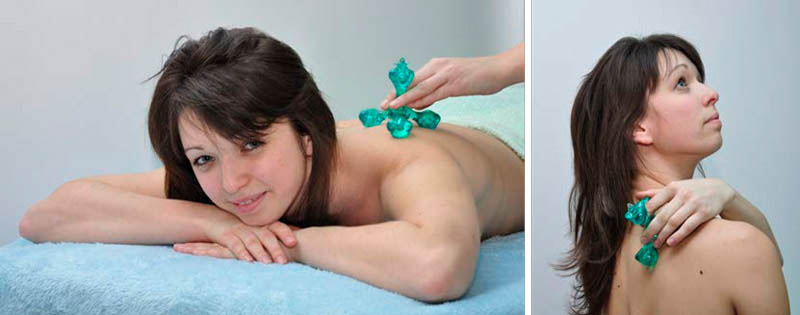
To improve the psycho-emotional state, to relieve stress, it is recommended to use applicators on the neck-collar zone (stress zone), on the interscapular region. Also, the use in the evening on any area of the body, depending on the problem, helps to restore sleep. The larger the area of influence, the better the therapeutic effect.
It is recommended to use such flat applicators: “Chamomile M” , applicator “Large mat” , “Massage needle large mat” , “Chance 6.2x4” , “Chance” , “Needle massage pillow” , “Quadro” , “Folk” , “ Sputnik plus " , " Insoles plus " .

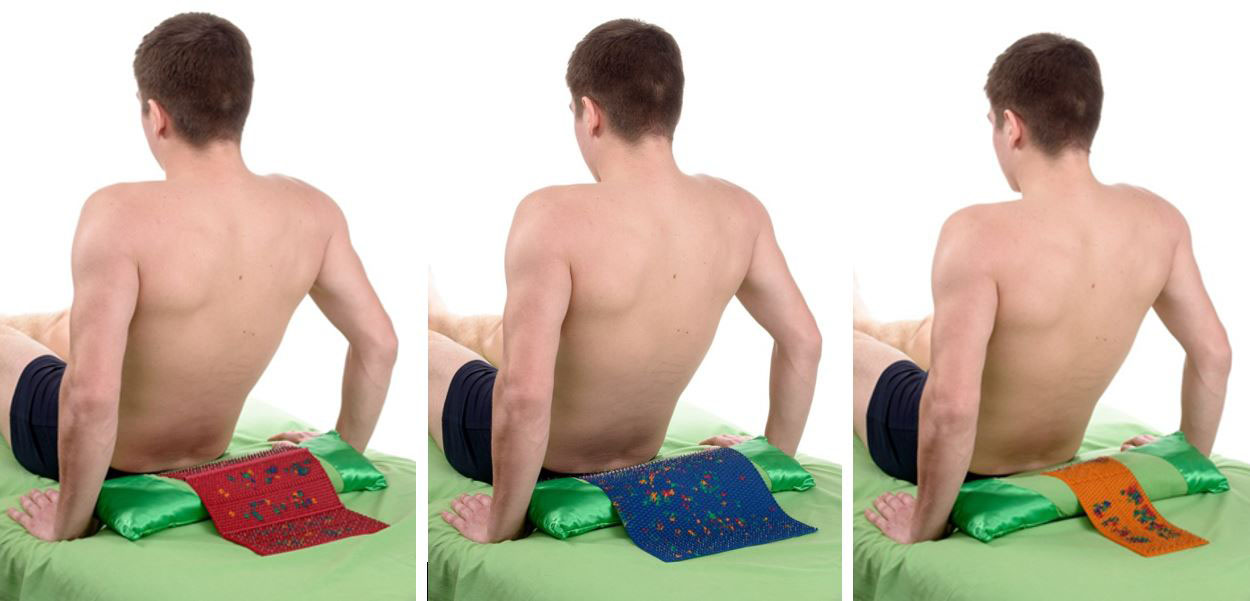

Rolling in the palms, on the head, on the face with the "Needle Ball" for 10-15 minutes gives a calming effect, helps to relax the nervous system, relieves headache, lowers blood pressure, improves sleep.
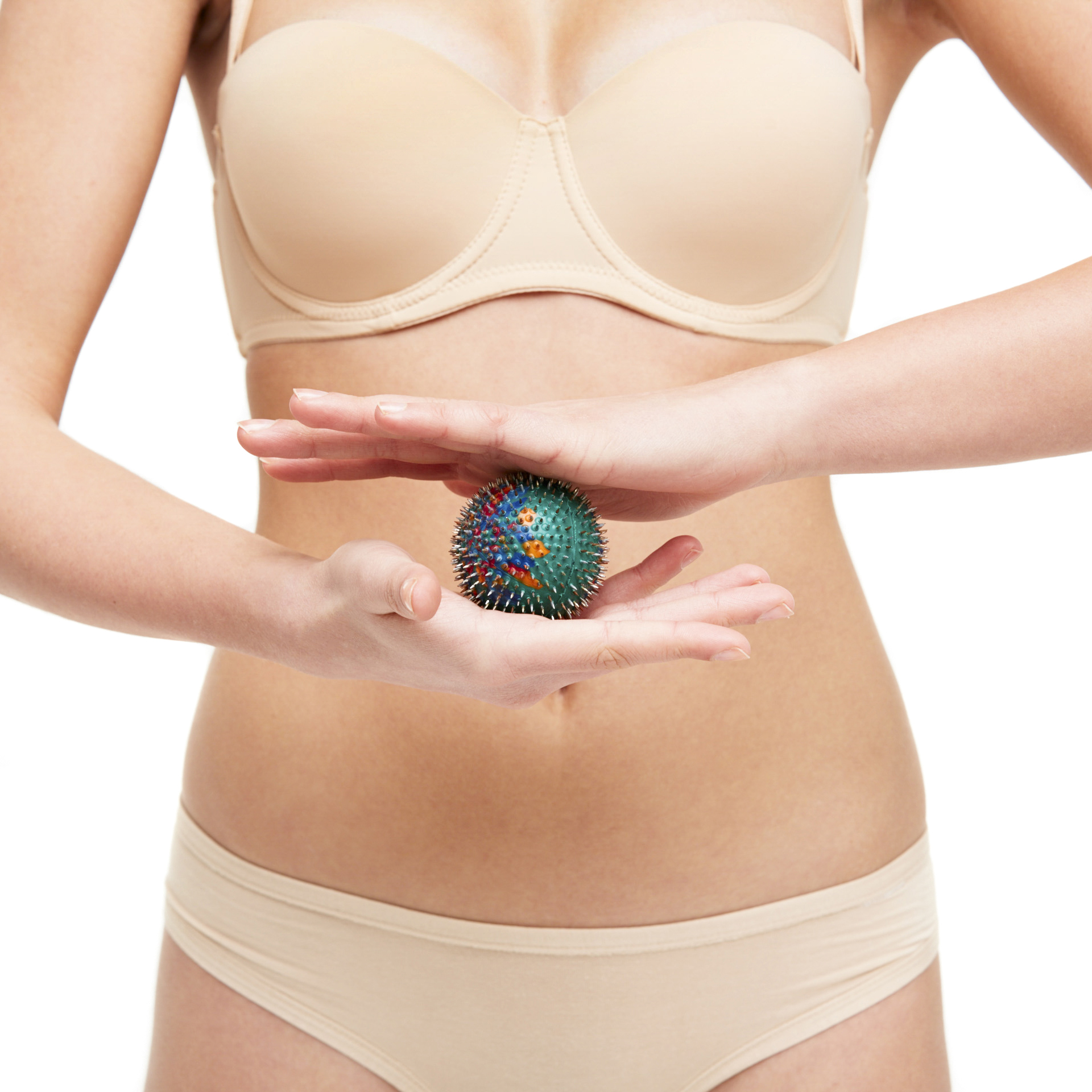
Application therapy is well combined with breathing exercises and meditation.
Breathing exercises
Before going to bed, it is recommended to do a set of breathing exercises. Everyone can choose what suits him best. It can be breathing exercises according to Buteyko, paradoxical gymnastics according to Strelnikova, Frolov's endogenous breathing, sobbing breathing from Y. Vilunas and others.
All of them are associated with a positive mood, which improves the functioning of the digestive system and the nervous system. These exercises can reduce heart rate, lower blood pressure and lower cortisol (stress hormone) levels by 20%, improve sleep.
For example:
- A five-second inhale, a five-second exhale, an imperceptible pause between inhalation and exhalation. Do 5 minutes 3 times a day.
- Inhale for 6 seconds, hold your breath for 3 seconds, exhale for 6 seconds or 5-3-5, as you like, etc.
Meditation
During the procedure before going to bed, you can create a pleasant, soothing environment, turn on relaxing music, dim the lights, light incense sticks. Classical music helps the brain suppress "abnormal" waves and improve health.
Application therapy helps the mind to disconnect from problems and gives the opportunity to be here and now. During the procedures, various meditation techniques work especially well.
Active points for insomnia. You can press these points with your finger about 30 times or act on their area with a small Kraplinka applicator.
Point "Shen-men"
Helps with insomnia, irritability, depression, memory loss, chest pain, shortness of breath, urinary incontinence. Perform pressure at least 30-40 times on one and the other hand.
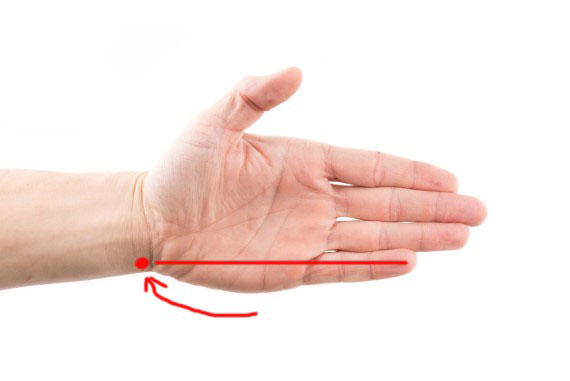
Point "Nei-guan"
The point helps to reduce pain in the heart, relieves anxiety and insomnia, diseases of the stomach and spleen. The thumb must be pressed at least 25-30 times, on one and on the other hand.
